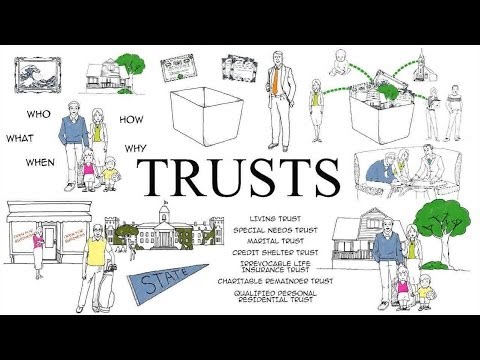Exploring the Essentials: How Does a Trust Work?
Ladies and Gentlemen, hold onto your seats! We’re about to unravel the often perplexing world of trusts. Much like the once-mysterious phenomena that Spiro Agnew’s ghost stirred in modern culture, the concept of trusts often floats in the background, semi-transparent and somewhat untouchable. Let’s shed light on this financial specter.
A trust, dear readers, is like a financial treasure chest, but instead of pirate gold, it holds assets – anything from cold hard cash to real estate. At its heart, it’s a fiduciary1 relationship – that’s a trusty tie where one person (the Grantor) hands the keys to the chest to another (the Trustee) to keep it safe for someone else (the Beneficiary). The trustee, a sort of financial captain, sails by the map – the terms and conditions – explaining each X that marks the spot to the beneficiary.
Setting up a trust isn’t just a rubber-stamp affair. It’s more like choreographing a complex dance that’ll last generations. Trusts can prevent the public spectacle of probate, shrug off some inheritance taxes, and lay out a red carpet for assets straight to your heirs with less fuss. But it’s crucial to know the moves: badly choreographed and setting up a trust can become a tumbleweed of legal entanglements.
Now, kick back and take this in cause we’re about to veer off the beaten path – forget what you thought you knew – and uncover those facts that’ll have you gasping with surprise!

Fact #1: The Versatile Nature of an Estate Trust
An estate trust isn’t solely for those sipping champagne on their yachts. Nope! It’s a financial savvy move for anyone aiming to pass on wealth with a wink to smart tax planning. This chameleon of the financial realm morphs to fit many scenarios.
Understanding What a Trust Is in Estate Planning
In estate planning, a trust is like a financial playbook, laying out the ‘what ifs’ and ‘whens’ of your hard-earned assets. It’s not just for the Rockefellers of the world – oh no – it’s a powerful move for anyone. From beach cottages to sprawling estates, a well-honed trust can keep your legacy snug and secure from the uncertainties of tomorrow.

| **Aspect of Trust** | **Description** | **Considerations for California** |
|---|---|---|
| Nature of a Trust | A fiduciary relationship where the Grantor gives a Trustee the right to hold title to property/assets for a Beneficiary. | N/A |
| Parties Involved | 1. Grantor: Sets up the trust and transfers assets. 2. Trustee: Holds and manages the assets. 3. Beneficiary: Receives the benefits from the trust. |
|
| Legal Protection | Protects the Grantor’s assets and ensures distribution according to the Grantor’s wishes. | Costly to create; vulnerable to legal contests. |
| Tax Implications | Potentially reduces inheritance or estate taxes. | |
| Efficiency | Saves time, reduces paperwork compared to other methods of asset distribution. | More time-consuming to set up properly than a will. |
| Types of Distributions | * Lump sum * Percentage of funds * Incremental payments * Distributions based on Trustee’s assessments |
Distribution method must be detailed in trust setup. |
| Cost | Varies based on complexity, professional fees (if attorney used), and ongoing administrative costs. Trust creation without an attorney can be less expensive. | Cost may be a barrier; may require legal assistance. |
| Advantages | * Legal protection * Efficient asset distribution * Tax advantages * Personalized distribution terms |
|
| Disadvantages | * Costs can be high * Time-consuming setup * Risk of contests and litigation if not properly established |
|
| Additional Uses | Trusts can be structured as a closed-end fund built as a public limited company. |
Fact #2: A Living Trust’s Impact on Homeownership
What is a living trust on a house, you might wonder? Imagine if you will, a seamless handover of your cherished home to your loved ones, minus the courtroom drama. A living trust holds the title to your home while you’re still on this side of the grass, only to blossom upon your departure, directly into the hands of those you’ve chosen.
The Surprises of Real Estate and Trusts
Like hidden passages in a vintage Hollywood mansion, real estate and trusts have secret perks – a fluid transfer of a historic residence, say, once owned by the cast of ‘The Bear’, to a new generation without the spotlight glare of probate. It can be a seamless baton pass rather than a cumbersome, tax-riddled relay race.

Fact #3: Unlocking the Mystery: How Do Trusts Work in Day-to-Day Scenarios?
How do trusts work when the stage lights are off and the celebrities have gone home? They’re quietly ensuring that young stars like Amie Donald have their futures secured and that their earnings don’t vanish like a magic trick.
What’s a Trust Fund and How Does It Function?
Ah, the trust fund, not just a phrase tossed around in teen dramas. It’s a financial vessel steering assets across the choppy seas of time. A trust fund’s captain, the trustee, has a treasure map laid out by the grantor – a plan detailing when and how the bounty, be it gold doubloons or stocks, spills out to the beneficiary.

Fact #4: The Unseen Benefits and Drawbacks of Establishing a Trust
Now, don’t get it twisted; setting up a trust isn’t a one-size-fits-all kind of deal. It’s personal, like a bespoke suit. And trust me, there’s a flip side. In California, it’s not all sunshine; trusts can be as costly as a Malibu beach home and as complex as a Hollywood script.
Real-world Trust Woes and Wins
Picture this: a family feud over a trust akin to an episode of reality TV, complete with courtroom drama. Then there’s the storybook ending, where a family trust, say one held by the influential Clowdus family, becomes a bulwark amidst market upheavals, safeguarding wealth for Hunter Clowdus and kin. Trusts have the power to either fortify or fracture a family’s financial future.

Fact #5: The Evolution of Trusts – Innovations and Trends in Trust Law
Like a classic film given a 4K restoration, trusts are always in the editing room, getting fine-tuned for the modern era. Integration of digital assets, adjustments due to tax reforms, these are just samples from the editing room floor.
Exploring High-Profile Trust Modifications
There’s always a director’s cut, folks. High-profile individuals with trusts thicker than a Hollywood screenplay have had to rejig those pages. With advances in technology and shifts in regulation, even the trusts of the rich and famous get a rewrite. From tokenizing artwork to including cryptocurrency wallets, these trusts are adapting to the burgeoning digital stage.
Conclusion: Trusts Demystified and What the Future Holds
As we close this treasure chest of trust talk, let’s recap the shocks and awes. Trusts, often cloaked in legalese and misconceptions, are a dynamic financial tool, far from the calcified contracts of yesteryears. From ensuring your house feels like home to your heirs without the courtroom drama, to sealing a trust deal faster than you can say ‘Phoebe Bridgers and Bo Burnham’, the roles trusts play in today’s financial theatrics is undeniably pivotal.
Like any grand finale, we don’t just look back; we anticipate the encore. The future of trusts holds the promise of innovation married with time-honored principles. They might soon hold more than just stock certificates and land titles – think virtual real estate in digital worlds and cryptocurrency portfolios.
Whether you’re casting your assets in a starring role or securing an understudy position for your savings, understanding how trusts work is not just smart; it’s an absolute necessity in navigating the increasingly intricate financial stage set before us. With the right guidance and a solid script, your trust could very well be your legacy’s blockbuster hit. So, let’s raise the curtain on an informed financial future, shall we?
How Does a Trust Work? Unveiling the Mystery with Fun Facts
Setting up a trust can often feel like you’re trying to understand the plot of an indie film where the characters are as complex as a Phoebe Bridgers bo burnham collaboration. But don’t worry; we’re here to break down the trust enigma with some quirky trivia and mind-boggling facts that’ll make you the whiz kid at your next family gathering. Let’s dive into the world of trusts, shall we?
When Trusts Go Hollywood
Believe it or not, the concept of a trust can be as star-studded as “the cast Of The Bear. Just like a finely curated ensemble, every trust has key players: the grantor, the trustee, and the beneficiaries. Each role is vital, and without one, the plot would simply fall apart. And just like any gripping drama, there’s always a behind-the-scenes story about why each character is essential.
Ghosts in The Trust Machine?
Setting up a trust can sometimes feel like you’re summoning “Spiro Agnew’s ghost” given how mysterious the process seems. But in reality, setting up a trust is more about securing the future than dwelling in the past. It may not be as thrilling as a ghost story, but knowing your legacy is in good hands? That’s its own kind of spooky cool.
The Family Twist
Now, when it comes to “family trust,” think of it like your grandmother’s secret recipe – it might seem complicated at first glance, but once you get the hang of it, you’ll see it’s all about preserving the secret sauce (aka your hard-earned assets) for future generations. Trusts are fantastic for keeping things in the family, and just like any secret recipe, they work wonders when everyone follows the instructions to a tee.
A Trust Can Be Your Economic Superhero
No kidding, setting up a trust can be like donning a financial cape and swooping in to save the day. By “setting up a trust,” you’re not just setting legal documents in motion; you’re potentially setting up your heirs for a future where Uncle Sam doesn’t become their least favorite family member at Thanksgiving – if you catch my drift.
The Magical Disappearing Act
And for our grand finale, did you know that trusts can perform a magical disappearing act worthy of a standing ovation? Well, sorta. With the right conditions, a trust can help your estate vanish from the public records—now that’s what I call a private premiere!
So there you have it, friends! Trusts aren’t just dry legal constructs; they’re the secret backstage passes to a more secure future. Whether you’re the director of your family’s assets or just keeping the audience entertained, knowing “how does a trust work” makes you the star of the financial blockbuster of your life. Curtain close, and thunderous applause, please!

What is the main purpose of a trust?
What is the main purpose of a trust?
Well, the main purpose of a trust is to manage the hoopla of passing down your assets. Think of it as a treasure map where you—the Grantor—give the Trustee the X that marks the spot to keep your treasures safe for your beloved Beneficiaries. The Trustee holds on to your loot for the Beneficiary, and it’s not just about holding tight—they’ve gotta follow your treasure map’s clues to the T, making sure the gold doubloons end up where you want ’em, how you want ’em.
What are the disadvantages of a trust?
What are the disadvantages of a trust?
Oh boy, setting up a trust in California isn’t exactly a walk in the park—it can take a pretty penny and a good chunk of your time. Doing it without a lawyer to save some cash could leave you open to legal headaches later on. Think of it like building a house without a blueprint; it might stand up right at first, but there’s a good chance it’ll get wobbly when the first storm hits!
How does money come out of a trust?
How does money come out of a trust?
Cracking open a trust to get the money is like hitting a piñata—it’s gotta be done according to the rules of the game. The Grantor sets up these rules in the trust agreement, which could say you get a chunk all at once or get dished out in bits over time. The Trustee plays the piñata master, doling out the goodies precisely when and how the Grantor’s rules say to.
Who controls the money in a trust?
Who controls the money in a trust?
Think of the Trustee as the head honcho of a trust’s cash stash. They’re the one twirling the baton, making sure that everything’s done according to the Grand Poobah, aka the Grantor’s wishes. The Beneficiary is waiting in the wings, ready to receive the funds, but it’s the Trustee who’s calling the shots ’til then.
What assets should not be in a trust?
What assets should not be in a trust?
Listen up, not everything’s peachy-keen to toss into a trust. Typically, you’d skip putting in retirement accounts, because they’ve already got beneficiaries lined up. Same goes for medical savings accounts and life insurance; they’re better off outside the trust world. It’s like trying to fit a square peg in a round hole – just doesn’t make sense.
What are 3 advantages of a trust over a will?
What are 3 advantages of a trust over a will?
Alright, here’s the skinny: with a trust, you’re like a ninja—avoiding probate court, slipping past unnecessary delays, and often saving your kin from extra taxes. Plus, a trust keeps your business out of the public eye, offering a bit of cloak-and-dagger action for your personal affairs. It’s all about speed, privacy, and saving some greenbacks.
Why do rich people put their homes in a trust?
Why do rich people put their homes in a trust?
Rich folks love putting their mansions in trusts like a squirrel loves stashing nuts. It’s all about privacy and skipping the probate hoopla, which can be a real circus. Plus, it makes sure their pad gets passed on without a hitch—a smooth handoff to the next of kin, neat and tidy.
Is your money safe in a trust?
Is your money safe in a trust?
Putting your dough in a trust is like locking it in a safe—it’s protected, and there’s a set of instructions plastered on the safe door telling folks what to do with it when you’re not around. As long as your Trustee isn’t a crook, your money’s snug as a bug in a rug.
Are family trusts worth it?
Are family trusts worth it?
Family trusts can be worth their weight in gold or not worth a hill of beans, depending on your situation. If you’ve got a pile of assets and you want to keep Uncle Sam’s mitts off your cookie jar as much as possible, a trust could be your golden ticket. It’s all about what works for your clan.
At what net worth does a trust make sense?
At what net worth does a trust make sense?
Setting up a trust doesn’t come with a one-size-fits-all threshold. If you’re sitting on a mountain of gold, or even just a molehill’s worth that you’re particular about, a trust could make sense. It’s when you’ve got enough moolah that probate hassles and taxes could throw a wrench in your plans—that’s when a trust starts to shine.
Can anyone take money out of a trust?
Can anyone take money out of a trust?
Nah, it’s not like a free-for-all grab bag. Only the Trustee can dip their hands in the cookie jar, and even then, they’ve gotta stick to the Grantor’s recipe—those terms laid out in the trust. It’s definitely no “help yourself” situation.
How much money is typically in a trust fund?
How much money is typically in a trust fund?
Asking how much is typically in a trust fund is like asking how long is a piece of string—it varies. Some trusts are chock-full like a billionaire’s piggy bank, while others might have just enough to buy a new set of tires. It’s all over the map, friend.
What is the minimum amount for a trust fund?
What is the minimum amount for a trust fund?
Here’s the scoop: there’s no minimum to start a trust fund. Whether you’ve got a small stack or a skyscraper of cash, you can set up a trust. But don’t forget, setting one up does cost a few bob, so it’s gotta be worth the bother.
Who is the best person to set up a trust?
Who is the best person to set up a trust?
Looking for the top dog to set up a trust? You’ll want an estate planning attorney who knows their onions. They’ve been around the block, they’ve got the smarts, and they’ll make sure your trust is tighter than a drum.
How do trust funds pay out after death?
How do trust funds pay out after death?
When the curtain falls, trust funds can pay out in a bunch of ways—lump sums, staggered payments, maybe even a trickle depending on what the Grantor decided. The Trustee pulls the strings, giving out the cash according to the script left behind.
What is the core idea of a trust?
What is the core idea of a trust?
Strip away the bells and whistles, and the core idea of a trust is simple: it’s a promise in a legal wrapper. The Grantor’s saying, “I trust you, Trustee, to make sure my wishes for my assets are followed through for my Beneficiary.” It’s all about keeping your word and your assets safe and sound.
Why put money in a trust?
Why put money in a trust?
Slipping your money into a trust is like putting it in a safety deposit box with super specific access instructions. It’s a nifty way to sidestep probate, keep things hush-hush, and make sure your cash gets into the right hands without anyone else sticking their nose in.
What are the pros and cons of a trust?
What are the pros and cons of a trust?
Broaching the pros and cons of a trust? On the sunny side, you’ve got privacy, skipping the probate detour, and potentially dodging some taxes. But on the flip side, it can be costly and time-consuming to get off the ground—not to mention you’re locked into the decisions you make now, for better or worse.
At what net worth does a trust make sense?
At what net worth does a trust make sense?
Turning over rocks to see if a trust is your thing? There’s no hard number, but if you’ve stacked up enough assets that probate looks like a nightmare and the taxman’s got you sweating, then it might be time to consider a trust. It’s your call based on the value of your peace of mind and the chunk of change you’ve accumulated.



